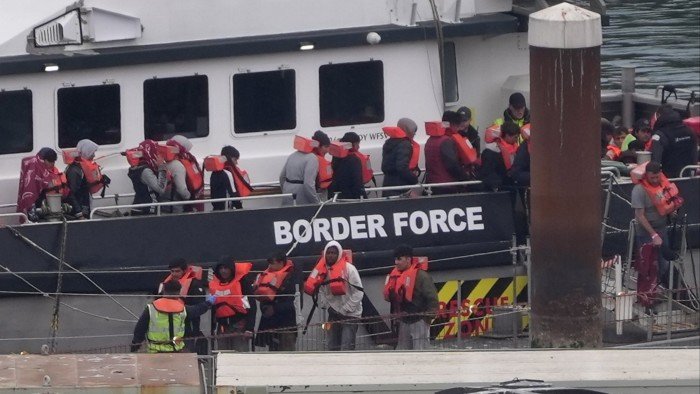Starmer-Macron deal on migrant returns valid for just a year, says French official

A reciprocal migrant returns deal between France and the UK will last for just one year and hopefully be followed by a “comprehensive” migration pact between the EU and Britain, according to a French official.
UK Prime Minister Sir Keir Starmer and Emmanuel Macron, president of France, on Thursday set out a “one in, one out” pilot scheme to launch in the coming weeks, under which some migrants who arrive in the UK via small boats would be detained and sent back to France.
The UK will then accept the same number of migrants from France who have a legitimate claim to come to Britain, notably for family reunification.
A French official said the pilot would be “valid until June 2026”. “That should give us [a] year to have discussions within the EU aimed at reaching a comprehensive migration package with the UK,” they added.
The Home Office declined to comment.
The intervention comes as the UK and EU have presented mixed signals about the extent to which the bilateral agreement has received support and approval from the European Commission, the bloc’s executive arm, amid severe pushback from several European countries.
Home secretary Yvette Cooper on Friday morning said the UK and France had been developing the pilot scheme since October and “EU commissioners have been very supportive”.
“We have designed this in a way to work, not just for the UK and France, but in order to fit with all their concerns as well,” she told LBC, adding: “We do expect the EU commission to continue to be supportive.”
But the commission said the EU’s executive was yet to review the pilot agreement itself, adding that it was “assessing” the migrants return proposal.
People briefed in advance of Thursday’s announcement said the UK would send up to 50 migrants a week to France under the scheme. But the French official said the figure was “not accurate” because no figures were included in the agreement.
“We’ll need to start with a certain volume, and if it works, it could gradually increase,” they added.
Cooper declined to comment on how many migrants would be part of the initial scheme.
Although the agreement marks an important turning point in British and French diplomacy, big hurdles to implementation remain, including tensions over where migrants who are rejected by the UK will end up.
The agreement poses difficult questions for the EU, and will shine a light on its dysfunctional internal systems for handling migrants that have long deeply divided southern and northern member states.
Starmer’s spokesperson said these arrangements had been discussed with the commission and “they did not expect any issues”.
“We’ve done a lot of work to make sure these measures are robust to legal challenges,” he added.
“The intention is for them to be dispersed away from northern France,” he said when asked what happened after irregular migrants were returned from the UK under the scheme.
He added that what happened to returned migrants was ultimately up to France.
Macron is taking a political risk by setting the post-Brexit precedent of taking back migrants from the UK, and is likely to face push back from opposition politicians, particularly from the far right.
Previous French presidents have refused requests by the British government to accept returns of asylum seekers, arguing they are people trying to reach the UK and are not France’s responsibility.
Xavier Bertrand, head of the Hauts-de-France region in the north of France bordering the channel, told BFMTV on Friday that the deal was “a bad deal for France” and a “good deal for the English”. “The English need to stop treating us like subcontractors,” he said.
“If there is no Europe this cannot work,” he said, noting concerns that France would have to keep even more asylum seekers as part of the accord because there would be nowhere else to send them.
“It’s up to the countries where they entered, Italy especially, to take up their share of the burden . . . This is primarily an issue for the EU,” he said.
The rightwing mayor of Calais, Natacha Bouchart, said she was “angry” about the new arrangement that she said would “add to the ranks” of illegal migrants that “bring disorder” to the city.

The so-called Mediterranean Five — Cyprus, Greece, Italy, Malta and Spain — have also spoken out against the UK-France deal.
The five states account for the bulk of migrant arrivals into the EU, and fear that France will seek to repatriate migrants deported from the UK back to them, citing the so-called Dublin rules on migrants remaining in the first EU country they enter.
But implementation of this mechanism has been patchy, following resistance from southern countries which argue they are overburdened by new arrivals and need more support from northern states.
For example, France last year only transferred roughly 8 per cent of those it had sought to return to their country of entry under the Dublin rules, according to Eurostat, the EU’s statistics office.
The deal comes at an awkward time for the bloc as it implements its new Migration and Asylum Pact, amid calls from some capitals for rules to be further tightened to restrict migrant arrivals.
https://www.ft.com/__origami/service/image/v2/images/raw/https%3A%2F%2Fd1e00ek4ebabms.cloudfront.net%2Fproduction%2F3b821889-5115-4632-bbd1-1e9aa6a40c86.jpg?source=next-article&fit=scale-down&quality=highest&width=700&dpr=1
2025-07-11 18:22:23





